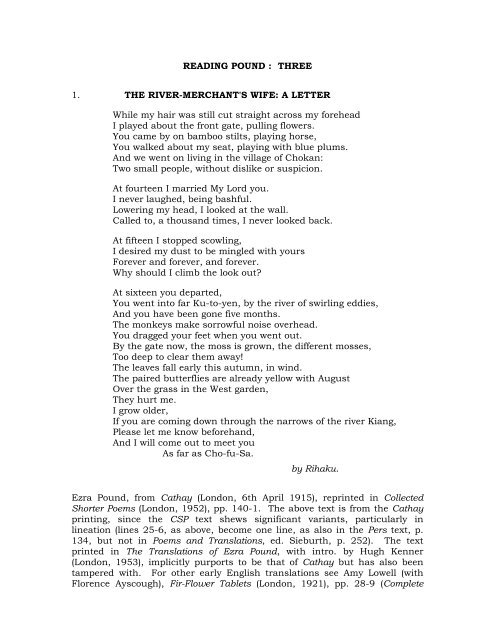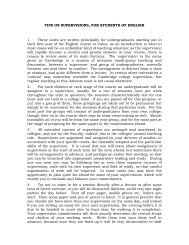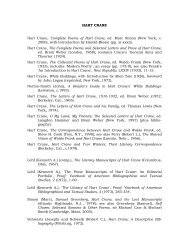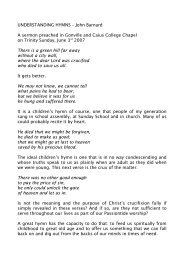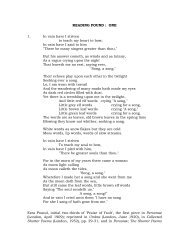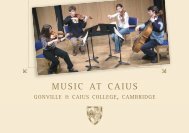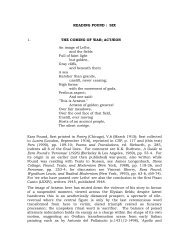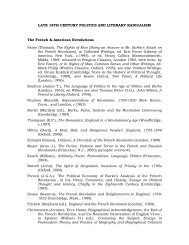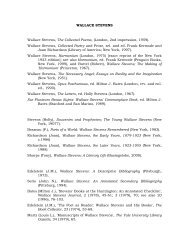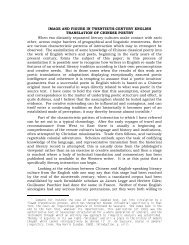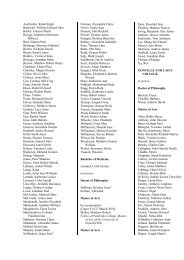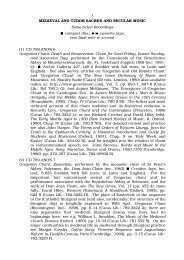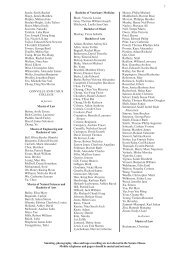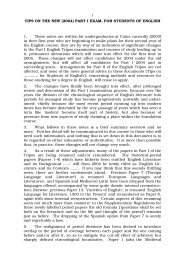READING POUND : THREE 1. THE RIVER-MERCHANT'S WIFE: A ...
READING POUND : THREE 1. THE RIVER-MERCHANT'S WIFE: A ...
READING POUND : THREE 1. THE RIVER-MERCHANT'S WIFE: A ...
You also want an ePaper? Increase the reach of your titles
YUMPU automatically turns print PDFs into web optimized ePapers that Google loves.
<strong>READING</strong> <strong>POUND</strong> : <strong>THREE</strong><strong>1.</strong> <strong>THE</strong> <strong>RIVER</strong>-<strong>MERCHANT'S</strong> <strong>WIFE</strong>: A LETTERWhile my hair was still cut straight across my foreheadI played about the front gate, pulling flowers.You came by on bamboo stilts, playing horse,You walked about my seat, playing with blue plums.And we went on living in the village of Chokan:Two small people, without dislike or suspicion.At fourteen I married My Lord you.I never laughed, being bashful.Lowering my head, I looked at the wall.Called to, a thousand times, I never looked back.At fifteen I stopped scowling,I desired my dust to be mingled with yoursForever and forever, and forever.Why should I climb the look out?At sixteen you departed,You went into far Ku-to-yen, by the river of swirling eddies,And you have been gone five months.The monkeys make sorrowful noise overhead.You dragged your feet when you went out.By the gate now, the moss is grown, the different mosses,Too deep to clear them away!The leaves fall early this autumn, in wind.The paired butterflies are already yellow with AugustOver the grass in the West garden,They hurt me.I grow older,If you are coming down through the narrows of the river Kiang,Please let me know beforehand,And I will come out to meet youAs far as Cho-fu-Sa.by Rihaku.Ezra Pound, from Cathay (London, 6th April 1915), reprinted in CollectedShorter Poems (London, 1952), pp. 140-<strong>1.</strong> The above text is from the Cathayprinting, since the CSP text shews significant variants, particularly inlineation (lines 25-6, as above, become one line, as also in the Pers text, p.134, but not in Poems and Translations, ed. Sieburth, p. 252). The textprinted in The Translations of Ezra Pound, with intro. by Hugh Kenner(London, 1953), implicitly purports to be that of Cathay but has also beentampered with. For other early English translations see Amy Lowell (withFlorence Ayscough), Fir-Flower Tablets (London, 1921), pp. 28-9 (Complete
2Poetical Works, ed. L. Untermeyer [Boston, 1955], p. 335); Witter Bynner, TheJade Mountain (1929) (The Chinese Translations [New York, 1978], pp. 113-4).Pound made this translation from 'Rihaku' (i.e., Li Bai) from the annotatedtranscriptions made by Ernest Fenollosa; for a brief summary of this processsee K.K. Ruthven, A Guide to Ezra Pound's 'Personae' (1926) (Berkeley and LosAngeles, 1969), p. 222 (his notes on the text are at pp. 205-6), and, more fully,Sanehide Kodama, American Poetry and Japanese Culture (Hamden, Conn.,1984), Chap. 3; Zhaoming Qian, Orientalism and Modernism; The Legacy ofChina in Pound and Williams (Durham, N.C., 1995), pp. 76-82. For theevidence that by the date of Cathay Pound knew well enough that 'Rihaku'was in fact Li Po (Li Bai), see Hugh Kenner, 'Notes on Amateur Emendations'in Lawrence S. Rainey (ed.), A Poem Containing History; Textual Studies in 'TheCantos' (Ann Arbor, Mich., 1997), p. 25, and Wenxin Li, 'The Li Po that EzraPound Knew', Paideuma, 27 (1998), 81-89. For the contradiction betweenimagism's direct treatment of the thing and translation's indirect treatment ofan historically remote discourse see Paul Morrison, The Poetics of Fascism;Ezra Pound, T.S. Eliot, Paul de Man (Oxford, 1996), pp. 16-19; Pound's idea totreat the ideogram as itself a talismanic, prediscursive thing was inherentlyself-contradictory, premised upon his lack of joined-up understanding, butsanctioned by his belief that only by such means could discourse participatein the nature of the reality that it renders intelligible.For more perceptive text-commentary see Christine Froula, A Guide to EzraPound's 'Selected Poems' ([New York], 1983), pp. 73-5; for overview see AchillesFang, 'Fenollosa and Pound', Harvard Journal of Asiatic Studies, XX (1957),213-38, and Ronald Bush, 'Pound and Li Po' in G. Bornstein (ed.), Ezra PoundAmong the Poets (Chicago, 1985), pp. 35-62, esp. (on 'The River-Merchant'sWife') pp. 40-2. For critical overview of the dramatic monologue tradition, andits bearing specifically on Eliot's practice, see J.P. Riquelme, Harmony ofDissonances; T.S. Eliot, Romanticism, and Imagination (Baltimore and London,1991), pp. 156-60, 320-5; Ronald Bush suggested that Eliot's procedures in'Gerontion' perhaps specifically recalled 'The River Merchant's Wife' and itsdramatising precision (Ronald Bush, T.S. Eliot; A Study in Character and Style[New York, 1983], p. 36; but on other strands in 'Gerontion' see JamesLongenbach, Modernist Poetics of History; Pound, Eliot, and the Sense of thePast [Princeton, 1987], pp. 3-4, 189-94). For closer discussion of Pound'spractice see Ming Xie, 'Elegy and Personae in Ezra Pound's "Cathay"', ELH, 60(1993), 261-81; more fully, his Ezra Pound and the Appropriation of ChinesePoetry; 'Cathay', Translation, and Imagism (New York, 1999), esp. pp. 114-19.Pound's version breaks the parallel couplet at lines 13-14, substituting'Forever and forever, and forever' as a self-ironic echo of her naive trust inperpetuity; in 'I never looked back' he supplies a distantly sombre echo ofEurydice's fate. In his copy of Cathay (London, 1915), Yeats has altered l. 7 toread 'At fourteen we were married to one another'; also, l. 14 is cancelled; seeEdward O'Shea (ed.), A Descriptive Catalogue of W.B. Yeats's Library (NewYork, 1985), p. 212. Bush comments astutely, about Pound's opening line:'The word "still" here is Pound's invention, and not Li Po's' (in his 'Pound andLi Po', p. 41); compare 'also' in 'Fan-Piece for her Imperial Lord'. Smithconsiders all this transcultural manoeuvring a blatant 'confidence-trick'; see
3Stan Smith, The Origins of Modernism; Eliot, Pound, Yeats and the Rhetorics ofRenewal (Hemel Hempstead, 1994), p. 7.For a yet further translation of Pound's version, into German ('Das Weib desFlusshändlers') see Eva Hesse (trans.), Ezra Pound, Dichtung und Prosa (West-Berlin, 1959), p. 63.2. <strong>THE</strong> BALLAD OF CH'ANG-KAN(The Sailor's Wife)I with my hair fringed on my foreheadBreaking blossom, was romping outside:And you rode up on your bamboo steed,Round our garden beds we juggled green plums;Living alike in Ch'ang-kan villageWe were both small, without doubts or guile . . .When at fourteen I became your brideI was bashful and could only hideMy face and frown against a dark wall:A thousand calls, not once did I turn;I was fifteen before I could smile,Long to be one, like dust with ashes:You'd ever stand by pillar faithful,I'd never climb the Watcher's Mountain!I am sixteen but you went awayThrough Ch'ü-t'ang Gorge, passing Yen-yü RockAnd when in June it should not be passed,Where the gibbons cried high above you.Here by the door our farewell footprints,They one by one are growing green moss,The moss so thick I cannot sweep it,And fallen leaves: Autumn winds come soon!September now: yellow butterfliesFlying in pairs in the west garden;And what I feel hurts me in my heart,Sadness to make a pretty face old . . .Late or early coming from San-pa,Before you come, write me a letter:To welcome you, don't talk of distance,I'll go as far as the Long Wind Sands!Li Bai, or Li Po (701-62), from Arthur Cooper (trans.), Li Po and Tu Fu(Penguin Classics; Harmondsworth, 1973), pp. 125-6. Pound perhaps did not
4know that the original poem was probably one of a pair, since the secondpoem has sometimes been excluded from the canon; Cooper translates bothpoems, and provides a first-rate brief commentary ('The poem is a love-poemto his wife but written as if from her to him, which was a common practice atthe time'--p. 127). For another modern translation of both poems see, e.g.,Elling Eide (trans.), Poems by Li Po (Lexington, Ky., 1983), XXVII, 1-2 (pp. 39-40). For an idea of the method and problems of such translation see DavidHawkes, A Little Primer of Tu Fu (Oxford, 1967; reprinted, Hong Kong, 1987).David Hinton in a note to his translation, The Selected Poems of Li Po (London,1996), comments that 'there is no reason to think that the husband is a rivermerchant'(p. 125). It is useful to know (maybe Pound did) that all marriagesat this time were arranged by family match-makers: the girl probably had nopart at all in the arrangements. Also, already by the start of the T'ang dynasty(618-907) a vast network of canals and canalized rivers had been constructed,to connect northern and western with east-central China and to carry, silk,salt, trading goods and above all grain (see Gernet, History of ChineseCivilisation, pp. 238-42); rich merchants controlled fleets of river-vesselswhose crews led a hard life with long absences from home. The places namedin this poem, entrepôts and danger-spots on the Yangtze waterway system,are very widely separated (though the Japanese transliterations suggest thatPound didn't know this directly). On the traditional danger of these gorges seeHinton's note, p. 129; on the emotional geography see Bush, op. cit., pp. 41-2.Beneath the surface of Pound's version we may sense the effects of manyfeatures of Chinese social practice which Pound could not know and musttherefore intuit. The uneasiness of the young wife relates to the Confucianvalues which insist on her husband as the sole source of validation in theirunion; and his expertise is the merchandising of goods and their exchangevalues: relative market prices. She by contrast clings to an alternativeromantic scheme of values, of tender constant affection, all too vulnerable, asclearly she recognises, to the erosion of distance and absence. Her onlyprotection is both a demure self-irony ('for ever and ever and ever') and theimplicit pain of unguarded affectionate totality; even this is ironised in theanecdotes about 'climbing the lookout' (a reference to legendary romanticloyalties which Pound evidently didn't comprehend). This is her onlynegotiating asset, and not wishing to play the market she keeps all herfeelings to herself; thus feeling them more sharply as the price of continuinghope and trust, even despite all the omens of seasonal change and the shiftsof time. Neither eager (running out too far) nor timid (not leaving the house)she will go just so far to meet him, her delicate modesty traced out by themute space of the indented last line (which in Cooper's version carries aclumsy exclamation mark, not of course in the Chinese). Pound's skill lies inthe exceptionally acute reconstruction by nuance and obliquity of this mostcomplex state of internal feeling; a skill learned (perhaps) from Browning.
6Sen kan fu itsu kaithousand call not once look backAnd though a thousand times called, not once did I look around......ju go shi tem bi15 first time open eyebrowsAt fifteen I first opened my browsi.e.I first knew what married life meant now she opens her eyebrows.i.e. smoothes out the wrinkles between her brows. She now beganto understand love, and to be happy.Gan do jin yo baidesire same dust together with ashesandAnd so I desired to live and die with you even after death, I wishto be with you even as dust, and even as ashes--partially together.Jo son ho chu shineternally preserve embrace pillar faithI always had in me the faith of holding to pillars.Ki jo bo fu daiWhy should climb look out husband terraceAnd why should I think of climbing the husband looking out terrace.ju roku kun en ko16 you far go.At 16, however, you had to go far away.fearful riverside both yen & yo are adj. expressing form ofwater passing over hidden rocksKu to yen yo tai144424443name yenyo-rockof locality eddy?(towards Shoku passing through the difficult place of Yenyotai at Kuto.)Go getsu i ka shoku5 month not must touchIn May not to be touched.The ship must be careful of them in May.En sei ten jo aimonkeys voices heaven above sorrowfulMonkeys cry sorrowful above heaven.Mon zen chi ko sekigate front late go footstepreluctantYour footsteps, made by your reluctant departure, in front of our gate.
itsu itsu sei rioku taione one grow green mossesone by one have been grown up into green moss.7Tai shin fu no somosses deep not can wipe awayThese mosses have grown so deep that it is difficult to wipe themaway.Raku yo shu fu soFallen leaves autumn wind earlyAnd the fallen leaves indicate autumn wind which (to my thoughtonly) appears to come earlier than usual.male femaleHachi gatsu ko cho ko8th month butterflies yellowIt being already August, the butterflies are yellow.So hi sei yen sopairs fly western garden grassAnd yellow as they are, they fly in pairs on the western gardengrass.Kan shi sho sho shinaffected (by) this hurt (female) mindnormal mypainedAffected at this, (absence) my heart pains.Za shu ko gan rogradually lament crimson face decay--olderbecome old.The longer the absence lasts, the deeper I mourn, my early finepink face, will pass to oldness, to my great regret.So ban ka sam pasooner (or) later descend three whirlsname of spot on Yangtse Kiang,where waters whirlIf you coming down as far as the Three Narrows sooner or later.Yo sho sho ho kabeforehand with letter report family-homePlease let me know by writingSho gei fu do yenmutually meeting not say farcoming to meetFor I will go out to meet, not saying that the way be far.
Choka chi cho fu sadirectly arrive long wind sand14444442444443a port on the YangtseAnd will directly come to Chofusha.(the port just this side of Sampa)8Ernest Fenollosa, Notebook transcription and annotation of Li Bai, 'ChangganXing' ('Chokanko' in Japanese). Text from 'Early Chinese Poetry / Kutsugen /KA-GI / E.F.F. / translation by Ariga', notebook now in the Beinecke Libraryat Yale University, File 20, pp. 128-35, as reproduced in Sanehide Kodama,American Poetry and Japanese Culture, pp. 80-4. The Japanese romanisationfollows the Hepburn system, then in vogue. The title of this poem in theoriginal eighth century Chinese does not refer to the narrative at all, but is thename for a specific classical type of poetic form, in which the number of lines,the exact number of characters (5) within each line, the mandatory rhymescheme, and so on, are strictly determined; the 'thematic title' to the Englishversion is entirely Pound's invention. On the other side of the page acrossfrom the lines about 'holding to pillars' and 'husband looking out terrace' areFenollosa's pencil notes:'referring to the story of a yangster [sic] called Bisei who oncepromised his love to be waiting for her below a bridge--she was late in coming, and the water gradually rose in tide, yetfaithful to promise he clang onto the pillar and was drowned.''Referrence to story where a wife, looking out for her husband,who was late in returning, she died in that position and waspetrified. The rock still pointed out and was called Bofutai.'Kodama's commentary (pp. 74-80) is informative but deaf to Pound's ironyand its expressive obliquities, which are qualities stationed in the Chineseoriginal by quite different means. For a more modern character-by-characteraccount of this poem, with the Chinese calligraphic text and a modern Englishtranslation, see also Wai-lim Yip (ed. and trans.), Chinese Poetry; An Anthologyof Major Modes and Genres (Durham, N.C., 1997), pp. 274-7; modern or not,the line which Pound renders 'They hurt me' and which Yip glosses as 'movedbythis hurt my heart' is then translated by Yip as 'These smite myheart'. Pound had some fun with 'smite' in the Yankee pastiche of his 'AVillonaud: Ballad of the Gibbet', a carouse set in a medieval French brothel(Poems and Translations, ed. Sieburth, p. 30). Verb sap.J.H. Prynne, last modified April 2006PDF file created on 8 September 2008


